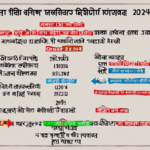The tracking of cyclones is a crucial aspect of weather monitoring and preparedness, especially in regions prone to extreme weather events. On May 16, 2021, Cyclone Tauktae made landfall on the west coast of India, causing significant damage and loss of life. As we continue to monitor weather patterns, the focus has now shifted to the Remal Cyclone and its potential impact.
Understanding Remal Cyclone
The Remal Cyclone, also known as Cyclonic Storm Remal, is currently developing in the Arabian Sea. As of the latest updates, it has strengthened into a cyclonic storm and is moving in a north-northwest direction. The cyclone is expected to intensify further before making landfall on the Oman coast.
Tracking the Path
Meteorological agencies and experts are closely monitoring the trajectory of the Remal Cyclone to predict its path accurately. The cyclone is projected to move towards the coastal areas of Oman, impacting regions such as Salalah and Sur. There is a potential for heavy rainfall, strong winds, and rough seas in the affected areas.
Potential Impacts
The Remal Cyclone has the potential to cause widespread damage due to strong winds and heavy rainfall. Coastal regions are particularly vulnerable to storm surges and flooding, leading to disruptions in transportation, communication, and power supply. It is essential for residents in the affected areas to stay informed and follow the guidance of local authorities.
Preparedness and Safety Measures
As the Remal Cyclone approaches landfall, it is crucial for individuals and communities to take proactive measures to ensure their safety. Some key preparedness steps include:
- Stay Informed: Keep track of weather updates from reliable sources to stay informed about the cyclone’s progress.
- Secure Property: Secure loose objects, reinforce windows and doors, and trim trees to minimize potential damage.
- Evacuation Plan: Be prepared to evacuate if necessary and follow evacuation orders issued by authorities.
- Emergency Kit: Prepare an emergency kit with essentials such as food, water, medications, and important documents.
- Communication: Keep communication devices charged and maintain contact with family and friends during the cyclone.
Frequently Asked Questions (FAQs)
1. What is the difference between a cyclone, hurricane, and typhoon?
- Answer: Cyclones, hurricanes, and typhoons are all names for tropical cyclones, but they are used in different regions. Cyclones are common in the South Pacific and Indian Ocean, hurricanes in the Atlantic and eastern Pacific, and typhoons in the western Pacific.
2. How are cyclones classified?
- Answer: Cyclones are classified based on their wind speed. They start as tropical depressions and can progress to tropical storms and cyclonic storms, with increasing wind speeds.
3. How are cyclones named?
- Answer: Cyclones are named by regional meteorological agencies to aid in communication and tracking. The names are chosen from predetermined lists and are usually common names in the region.
4. What measures can individuals take to prepare for a cyclone?
- Answer: Individuals can prepare for a cyclone by securing their property, creating an emergency kit, staying informed, having an evacuation plan, and following the instructions of local authorities.
5. How do meteorologists track the path of cyclones?
- Answer: Meteorologists use various tools such as satellites, radars, weather models, and historical data to track the path of cyclones. Advanced technology helps in predicting the trajectory and intensity of cyclones with greater accuracy.
Conclusion
The tracking of the Remal Cyclone is a critical task to minimize the potential impact on coastal regions. By staying informed, preparing adequately, and following safety guidelines, individuals and communities can enhance their resilience to extreme weather events. Stay vigilant, stay safe, and be prepared for any developments in the path of the cyclone.



